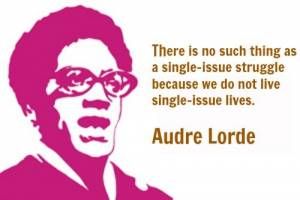
“There is no such thing as a single-issue struggle, because we do not live single-issue lives.” – Audre Lorde
As I reflected on the content of the April e-update, I was struck by how pulled I was to ensure that our readers were not left with reinforced stereotypes about Latinas/os. Alcoholism is a problem. Not just for many Latina/o individuals, but for our society as a whole. We socialize people to celebrate when something good happens, and to drown out their sorrows when something not so good happens. My reflections reminded me how easy it is to narrowly define people, things, places…you name it, we do it. I myself was reinforcing a narrowly defined idea of who we as Latinas/os are, or at least I was concerned about others doing so. I wanted to make sure that we did not reinforce many people’s already existing stereotypes and limited notions of who we are. Claude Steele coined this term as Stereotype Threat. Essentially, the person believes you are going to perceive them in some stereotypical way, so you do whatever you can to ensure that you do not reinforce that stereotype. Whether the person actually holds this belief or not is irrelevant. There are realities to stereotypes, hence how they become so ingrained in our minds and hearts.
As I situated myself more in the content of April’s e-update, I was also reminded of the Audre Lorde quote above and remembered that we are complex, whether we are Latina/o or some other cultural community. Our lives cannot be defined by anyone thing, or at least they should not be. It is disconcerting when I think about how much we rely on overly simplistic notions of who we are, and who others are. My hope for those who read this month’s e-update is that our readers will contextualize not only the content, but also the culture. As is highlighted, there are stressors, very real, not perceived, that impact the daily lives of Latina/o communities. While I do not encourage anyone to engage in unhealthy habits, when I contextualize the intersectionality of race, ethnicity, social class, power, and substance use in society, it is hard for me to rely on limited ideas, solutions, and knowledge as I attempt to make sense of the world around me. Martin-Baro (1994) states that psychological theories based on positivist perspectives, focusing only on what can be seen and measured, leave out the possibilities contained in the person-situation dynamic. An example of what this means within the context of Latinas/os and substance use, is that we simply understand this phenomenon as the manifestation of hypermasculine behaviors in a Latino who has problems with alcohol. Or, the individual Latino male may simply be manifesting what many would erroneously deem to be cultural practices. The problem with this limited understanding is that it leaves out the complexity of his essence/being and how his historical, social, and economic factors affect his role as someone who uses substances, and potentially abuses them.
A contextual and dialectical approach to understanding the intersection of Latinas/os and substance abuse explores how these factors maintain and support problematic behaviors and attitudes, while also exploring all the possibilities for change. For many Latina/o immigrants, and those born here in the United States, it is essential to take into consideration the status in which society has placed us, in addition to the culture of coping and oppression in our native cultures and the one in which we have arrived. Contextualizing an individual or family’s current challenges within the larger current and historical contexts brings integrity to the healing process. Seeing the connection between individual/family problems and the larger sociocultural context helps clients recognize that they are part of a larger network of oppression, which allows them to feel less burdened by individual pathology, in this case only being seen as someone who abuses alcohol.
When we continue to reinforce that wellness only occurs within the individual, we are simultaneously supporting the reinforcement of society’s health status quo. How can we make healing and mental health services for Latinas/os who may have problems with alcohol a process of liberation over a process of compliance to society’s everyday oppressive expectations? How can we become more critically conscious? Critical Consciousness has been defined as the awareness of the sociopolitical context of daily life. It means understanding the everyday realities that we take for granted and how the world operates (i.e., mental health service delivery systems is deeply still grounded in individualism and at times, oppressive practices to devalued communities). As you read this e-update, how can you situate the content within larger sociopolitical practices, remain critically conscious, and most of all humanize the person and community? How can we remain diligent in understanding our own limitations in how we see others, and even more importantly, how our limited notions of others also limits our capacity to see the possibilities for change in others? We are not single-issue people, therefore, it would serve us well to look beyond any one issue, flaw, strength, etc., to see who people really are, where they come from, and who they might become.